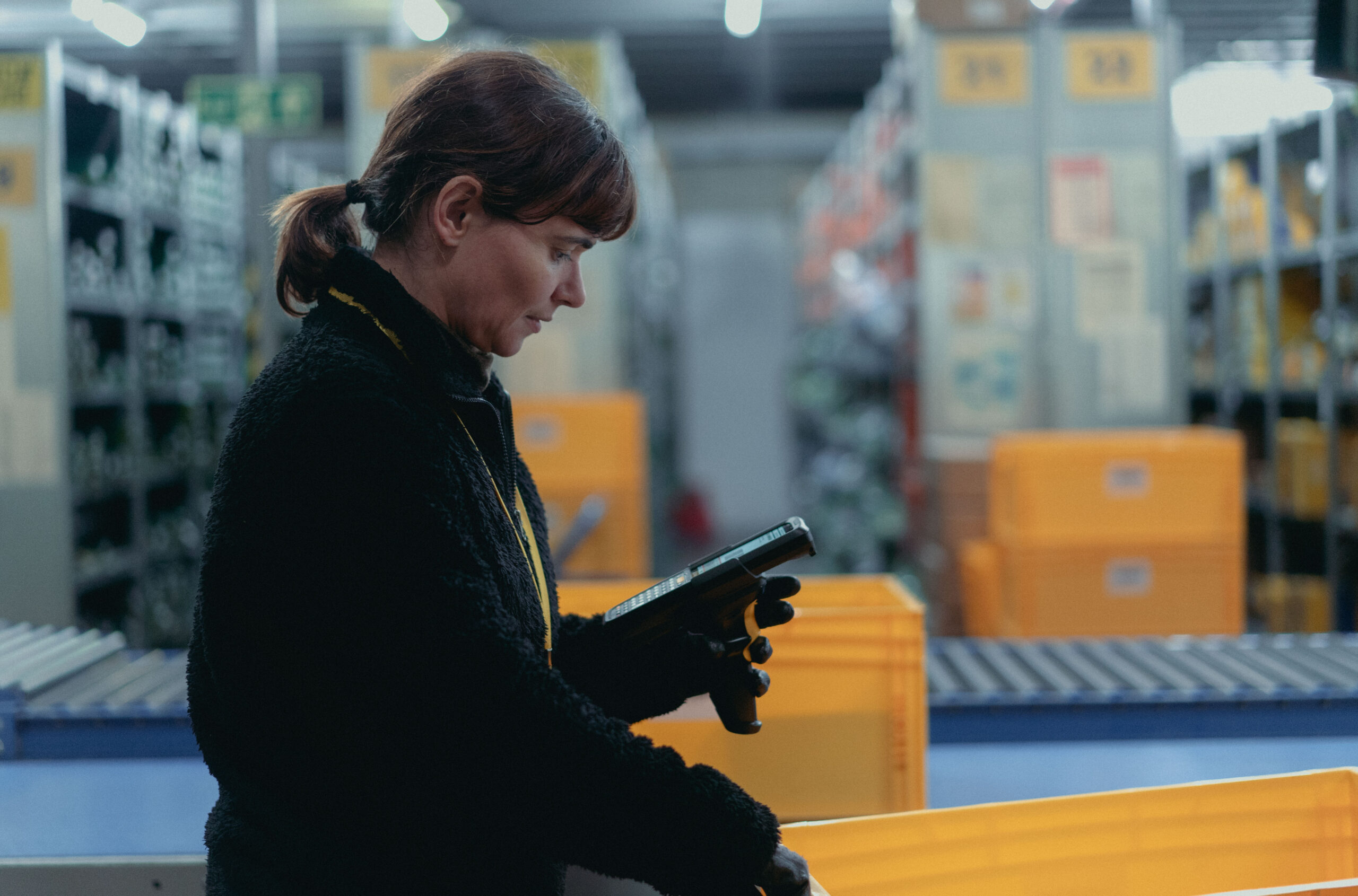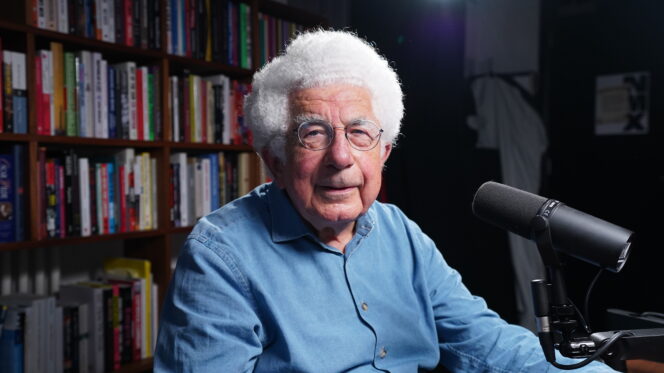Warehouse Workers Are Too Tired to See a Way Out
New film On Falling plumbs depths of customer fulfilment hell.
by Juliet Jacques
24 March 2025

Laura Carreira’s debut feature film, On Falling (2024), is a sobering, social realist look at the working conditions of ‘pickers’ – the people in warehouses who ‘fulfil’ customer orders made on big sites like Amazon. Produced by Ken Loach’s company Sixteen Films, On Falling follows ten days in the life of Aurora, a Portuguese immigrant living in shared accommodation in Edinburgh, whose wages only just sustain her lonely existence and for whom any unexpected expense is a disaster. These difficult circumstances eat away at her confidence and her sense of self, making her unedifying situation difficult to escape.
“I’d already looked at the gig economy in my shorts, most recently The Shift (2020),” says Carreira, who drew on her own experiences of moving from Portugal to Scotland and working with other migrants in writing On Falling. “It got me onto the logistics industry, which is rife with insecure work in the UK.
“It seemed so strange that ‘pickers’ existed. When companies brag about how quickly you receive your order, I never imagined someone rushing to get the item, being timed to the second.”
Carreira interviewed pickers to help her create the central character. “I don’t think people are used to being asked what they do in such detail,” she says. “They started opening up about their lives – not just the job, but their thoughts about the future. It made the film a bit darker – people would say, ‘I don’t know if a different job would fix my situation.’ They were almost too tired to see a way out. So I brought that in, but also lighter aspects, like the dildos that Aurora takes off the shelves throughout. Audiences kept relating those to the theme of loneliness, but I put them in because everyone I talked to mentioned it.
“But people kept talking about free time – how the job shuts down possibilities outside. Aurora seems to live in the margins, never having a strong connection with the city other than going out at the weekend, and when she does a job interview. That creates a real sense of isolation – it was important to focus on that rather than any backstory, especially as her family and friends aren’t with her in Scotland.”
Test audiences wondered why Aurora didn’t do more to change her life, or ask for help. “I wanted to look at the system she’s being put through, rather than blaming the individual,” says Carreira, and the film is careful to show how Aurora’s work and home life interact, showing the negative effect of the former on the latter.
As well as showing Aurora with her colleagues, struggling to find anything to talk about other than the weather or what they’d recently watched on television, Carreira had to portray her line managers. One thing that struck me was how their attempts to be kind, as a way of trying to mitigate the awful conditions, created a different problem to obvious cruelty. Giving workers a chocolate bar for good performance “is almost worse than not having a reward”, says Carreira, but people she interviewed were “weirdly kind to their managers, saying they earned only a bit more and their jobs were worse because they had to go around telling people off”. Certainly, the managers’ touch is light, but the collegiate way Aurora’s manager asks her to speed up when she’s having a personal crisis just highlights how hard the environment is for everyone.
Carreira chose Joana Santos – a soap star in Portugal – to play Aurora after a big casting call. It was difficult to find people to play Polish workers or Scottish managers because actors were used to concealing their accents to secure roles, and Carreira had to impress upon applicants that this was not the case for On Falling.
The team found plenty of non-actors for the warehouse roles, asking people to send a tape talking about their lives, and giving people similar jobs in the film to the ones they had in real life. “That gave them ownership over the character,” says Carreira. “Even though I had dialogue written, I let people come up with their own lines. It made things more horizontal and it removed the sense of the whole script being my voice – we got characters who felt more rounded and realistic. It was a wonderful process.”
The storyline pivots around several small moments – things that wouldn’t be a big deal in most circumstances, but for Aurora, are a real problem. “I didn’t have a clear sense of the structure at first,” says Carreira. “I knew she was going to struggle financially, and that any crisis would come out of an accident. An unexpected bill creates a snowball effect for the rest of the week, and until her next payday.
“The details were an accumulation of stories people told me – that’s how the difficulty in connecting with people during the breaks, because they were so exhausted, came out. When Aurora asks a colleague what he does outside work and he says, ‘the laundry’, that was direct from a conversation I had. These mundane aspects build up to a climax.”
On Falling has a granular realism to it but is recognisably a feature, and I ask what a fiction film can do with this subject that a documentary cannot. “I was trying to make documentaries and it was impossible to get access to companies,” Carreira explains. “Even when I did, it was so controlled – they would let me speak to two workers. And I thought – why those two?
“I felt like my experience was being created, especially as it was hard to ask people simple questions about how they did their jobs. What did they have to gain from telling me the truth in front of their bosses? Using fiction, I could have proper conversations without people worrying about their livelihoods being at risk. Even then, some of them came back to me a week later to make sure they couldn’t be identified. This level of fear about even talking about their jobs was very revealing.”
The influence of Ken Loach, especially his Sorry We Missed You (2019) about a gig economy worker, can be felt throughout On Falling. “Ken’s films always represented something about cinema that I aspired to,” says Carreira, “showing characters struggling with money and work. I didn’t see that in other films.
“I didn’t have a producer for On Falling, but then I got introduced to Sixteen Films. Ken retired after The Old Oak (2023) so they were looking for filmmakers who were interested in making political films about the realities of day-to-day living. I had a script, so we talked about it, and we had similar views on cinema and the wider world. I was so lucky to have their support – they had experience with using non-actors, working in real locations and in shooting chronologically.”
Carreira’s next film will be about office work, focusing on “a character who has a bullshit job”. She is currently writing it with Sixteen Films and will interview workers for it, just as she did for On Falling. There is no projected date as yet, but Carreira’s debut feature suggests it will be an uncompromising look at how a huge section of the British population actually works – and that realist films that treat working life as something worthy of serious consideration will not retire with Ken Loach.
On Falling is available to watch in selected UK cinemas now.
Juliet Jacques is a writer, filmmaker, broadcaster and academic.


